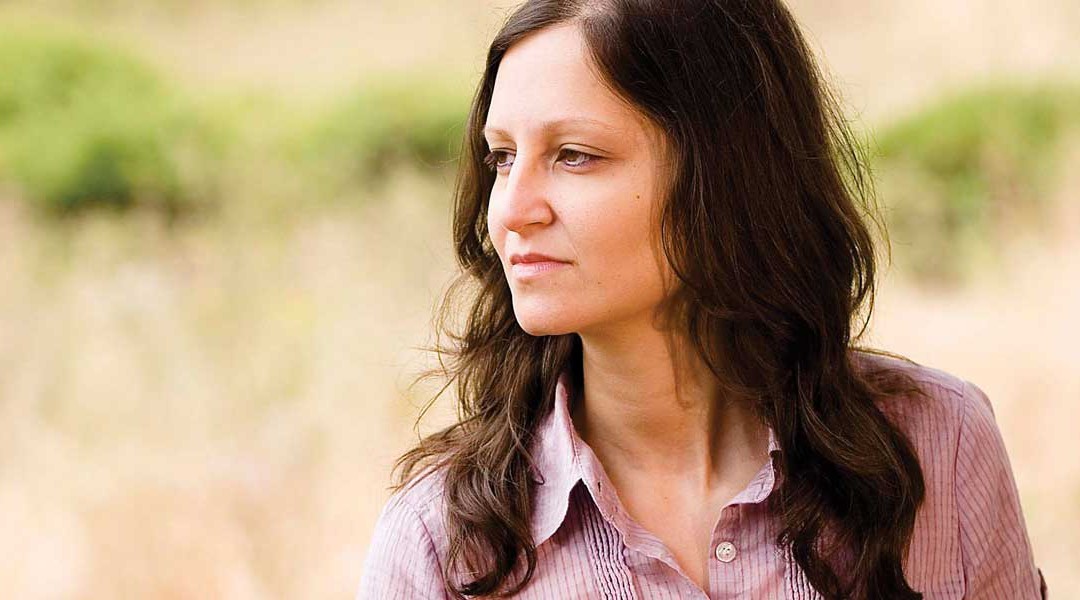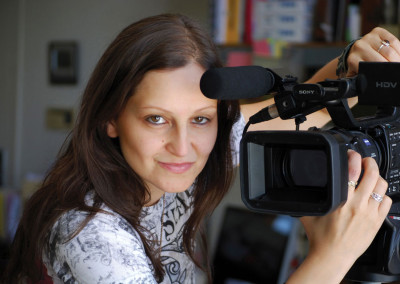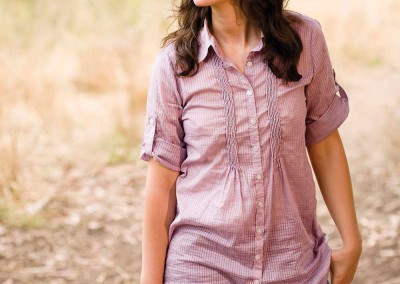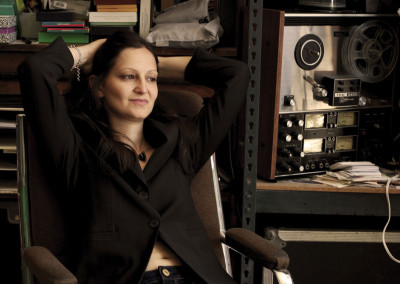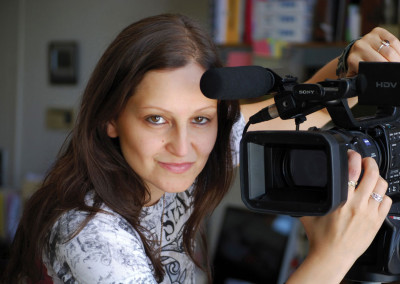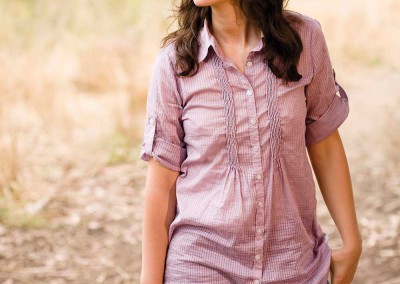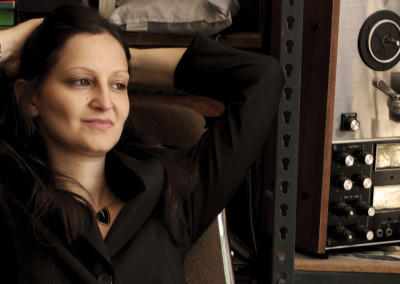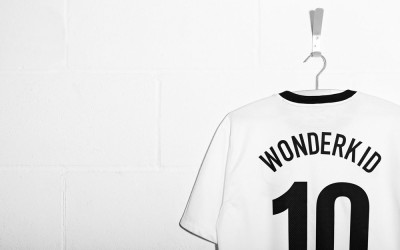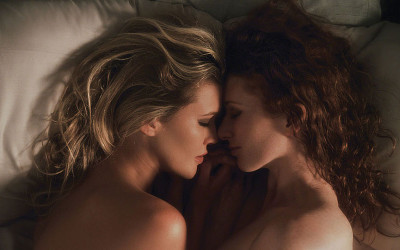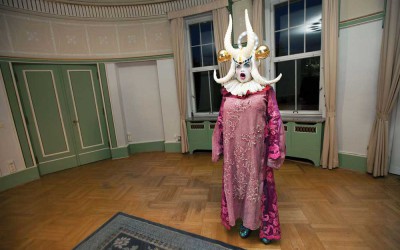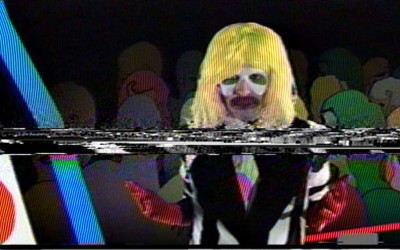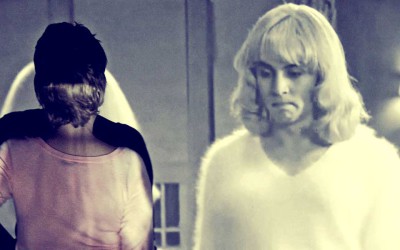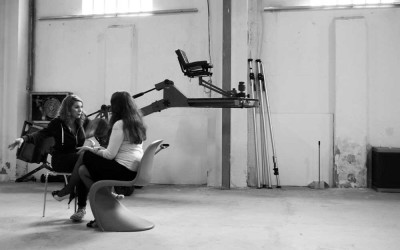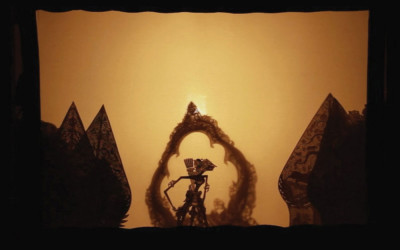Rolla Selbak
Text JF. Pierets Photos Rolla Selbak
Up till now she has made 2 feature films, a bunch of short films, a music video and 2 seasons of ‘Kiss her I’m famous’. The Spreecast ‘Grrls guide to filmmaking’ in which she interviews female movie directors, turned into a docu series and she’s currently writing a TV-piece. I guess we may call ourselves quite lucky that she found the time to talk to us, but most of all she left us highly inspired after our conversation about independency, feminism and religion.
Why is it important to be an independent filmmaker?
It’s very important to me because that’s mostly the only way a lot of people can work right now. I have a very independent spirit and the thought of actually being merged into the Hollywood system makes me cringe. The thing I hate about it is the fact that you give up all control and that someone else is telling you what to do. It makes good sense though, because essentially it’s someone else’s money so they want a minimum risk. Yet it really stifles creativity. Obviously it would be ideal to have your work in the television- or in Hollywood system without having to compromise, since a lot more people would be able to see your work.
So the internet is sufficient at the moment?
At this point, this is where my heart is. I think for filmmakers not to put their work online, if they’re independent like me, doesn’t make any sense. How is the audience going to know you? Who are you, where are you? You can’t just do only film festivals anymore and the internet is the most beautiful tool in the world. You can play. Everyone can see your work and hear your voice, I think it’s the best way to experiment. So before you send that script to Hollywood, to the show networks, it’s a great way for you to understand what your audience likes and doesn’t like. You can see which episodes have the highest rating, you see the comments, you see what people enjoyed. It’s fascinating. It’s a beautiful laboratory, one huge experiment.
You also have a Spreecast where you interview female filmmakers?
Yes, live stream interviews where the audience can log in and chat, ask questions. I did that on a monthly basis and I now turned that into a docu series, which you can currently see on-line. It’s me, going to the filmmakers’ homes, having a very casual chat with them in the space where they create. I thought that was a more intimate way to actually get to know the filmmaker. It was very important for me to showcase and celebrate female filmmakers, to counteract the voices that say that there are no female filmmakers or that there’s only a small percentage because females don’t like filmmaking. Or are not interested. They keep on making excuses on why the numbers are so low. This series is meant to inspire others, showing aspirant filmmakers that if she can do it, you can do it.
A happy feminist.
Feminist? Me? Nooo! Haha. I’m a very proud feminist card holder and I think any woman or man who is for the progress and equality of women in the world, is a feminist. Whether they like it or not!
Talking about feminism, a lot of your work handles the subjects of arrange marriage, homosexuality, Muslim-American subcultures. You’re quite a committed woman.
That is one way to say it, certainly. I try to tackle all those subjects in my films. Sometimes that’s a little ambitious, but I try to do it in a very nuanced way instead of being exploitative. I really did want to cover as much as I could when it comes to a female experience in the Muslim-American subculture. That does include the idea of arranged marriage – because that definitely still happens – and the idea of being closeted in that community. You’d be surprised to hear how many people actually connect with that story line. And then the other story line has to do with abuse, which lots of women go through. I wouldn’t say that that’s unique to the Muslim subculture but I’m certain that happens internationally. It was important for me to touch upon all those subjects.
These are also very personal subjects?
I grew up Muslim, so it’s indeed very personal. My family is Palestinian and I grew up in Abu Dhabi. We moved to the US but I definitely have that perspective as someone who is from the Muslim-American subculture. It’s just something that I feel wasn’t being presented in cinema, in film, in media. I basically made a film that I myself would have loved to see when I was younger. I felt like there was nothing out there that I could connect with. That understood my experience, that made me feel like I counted.
‘It was very important for me to showcase and celebrate female filmmakers, to counteract the voices that say that there are no female filmmakers or that there’s only a small percentage because females don’t like filmmaking. Or are not interested.’
How did you grow up?
To be honest, it was very lonely. Even when I was always surrounded by family, which is very common in the Middle Eastern culture. Everything is always everyone’s business and privacy is not a privilege you get. Certainly not when you are living in your parent’s house, parents who loved me, by the way. A Big Fat Greek Wedding kind of family, caring and loving. But when you’re growing up as a woman, trying to find your place, your ideas, and you’re trying to see where you fit in all of this, it can end up being isolated and lonely.
So what did you do at that age? Being without any role models?
I lost myself in movies. That was my escape. I have a computer science background and the best part about being a geek was that I could build my own computer, put my own dvd drive in it so I could rent movies and watch them in my room. Where no one would know. Specifically the lesbian side of me loved Angelina Jolie movies like ‘Gia’ and ‘Girl Interrupted’. Also the movie ‘Fire’ (one of the first mainstream films in India to explicitly show homosexual relations. Ref.) was a big deal to me. So basically I got lost in movies. Which made me feel like I wasn’t alone. Because of that I thought film was the perfect way to tell such stories so other people wouldn’t feel alone.
But at one point you did come out of the closet.
Yes, and it was a nightmare. I got kicked out of the house after my parents first completely ignored my existence and then send me to a psychologist. When that didn’t work, they wanted me to undergo an eradication of my supposed hormone imbalance. I’m telling you this in a nutshell, yet the humiliation was unbearable.
Nevertheless you are calling your mother the bravest woman you know.
At one point she got diagnosed with heart failure and had only a few years to live. Since then she really turned around and decided that she wanted to open her heart and mind. Can you imagine that you come from a culture that keeps indoctrinating you, saying ‘gay is evil!’ Where they keep telling you that having a gay child is even worse than having a dead child. When you have that kind of legacy in your mind and culture since you where a baby, you have to overcome a lot to open up. I always say my mother is the bravest woman because I know she had to almost stretch both her heart ànd mind. It really took a lot from her to do that. But I flew her out to San Francisco where I was living at the time and she even met my partner. We had a great time. She passed away shortly after that. It ended in the most beautiful note and she is my hero. It was very important that we went through that.
What did that kind of indoctrination do to you?
I would say that the number one thing I suffered from was me, hating myself. Not even other people hating me. I was torturing myself essentially. I’d go to school and pretend everything was fine and then I’d go home and would literally be hitting myself. Slapping myself in my room. I just wanted it to go away. I hated myself so much. I tried by reading the Koran, try to slap the gay away. But of course it didn’t work. In the end you just have to get into it. Saying; ‘this is who I am. What can I do? I can’t do anything about it except be myself and be honest, that’s all’.
Are you still religious?
I used to be very religious. It was a part of me and I would pray every day. But now? No. I’m not religious at all, I’m agnostic. I believe all religions have beauty in them whether or not god exists the way we want him or her to exist. The only thing I know is that we don’t know anything. I think anyone who claims that they know something is bullshitting, because they don’t. Yet I do love the sentiments that religions have about how we should treat each other, how we should go through life. And I acknowledge that religion is sometimes necessary for some people to keep going. Without religion some people are lost, have no clue about why they are here or what we are doing. But the truth is that no one has a clue. We try to explain it in a way that makes us feel better and that makes us feel sane. Having sanity and the knowledge that it’s all going somewhere. Especially regarding an afterlife. No one knows!! How is someone ever going to know? All those basic questions asking; ‘does this all matter’, ‘what was it all for’, ‘why was I here’,.. It began and it ended. So the idea or notion of an afterlife is essentially saying ‘we matter’. Our lives matter. Well, if so; hurray! Great! But if not, whatever. Religion was essentially a worldwide way of law and civility. Don’t steal, don’t kill, don’t do this and don’t do that, be humble, share your money. But do you really need a book to tell you all this? And if the only reason you’re behaving like that is for you to be able to selfishly go to paradise, then we’re kind of screwed don’t you think?
Related articles
The Trans*Tapes
The Trans*Tapes is a series of six short portraits about transgender people in the Netherlands, made by three transmen; Bart Peters, Jonah Lamers and Chris Rijksen. Released in 2015, The Trans*Tapes focus on strength, positivity and…..
Satyricon Beta
“I’ve promised you the story of my adventures for a long time. Today I’m finally going to keep my word. My unhealthy curiosity and my depraved imagination are the true product of Roman immorality, which is the basis of your education.” These…..
Wonderkid
There are 5000 footballers in the UK and not one of them is openly gay. Clubs prevent players from coming out because of an elegit increasing commercial market value, which may be damaging to both the sport as to its players. Not only…..
Marina Rice Bader
Executive Producer of the lesbian themed movies ‘Elena Undone’ and ‘A Perfect Ending’, Marina Rice Bader, is releasing her feature length directorial debut ‘Anatomy of a Love Seen’ as a streaming rental, breaking outside of and bypassing the traditional…..
One Zero One
One Zero One is Tim Lienhard’s first independent feature film starring Cybersissy and BayBjane. This 90-minutes long documen-tale tells a true story about a most unique friendship, about survival at the edge of society and about the final…..
Live Nude Dancing
Live Nude Dancing is a collaboration between photographer Daniel Trese, choreographer Ryan Heffington and animator Johnny Woods. Commissioned by MOCAtv. The film is based on a piece from Heffington’s critically acclaimed show KTCHN that…..
Ed Wood
Since the biopic ‘Ed Wood’ starring Johnny Depp, the for nearly two decades forgotten eccentric of the 1950s, Edward D. Wood Jr. enjoyed a success that quite escaped him in life. His technically inept, but oddly fascinating films are shown at…..
Erika Lust
Someone once told her that she must be the cutest porn director he ever met. She thought that was a good thing, because most people still think you have to be a freak to make this kind of movies. We’re in Barcelona, in a huge loft. During lunchtime…..
Children of Srikandi
Children of Srikandi is the first film about queer women in Indonesia, the country with the worlds largest Muslim population. Eight authentic and poetic stories are interwoven with beautiful shadow theater scenes that tell the story of…..
